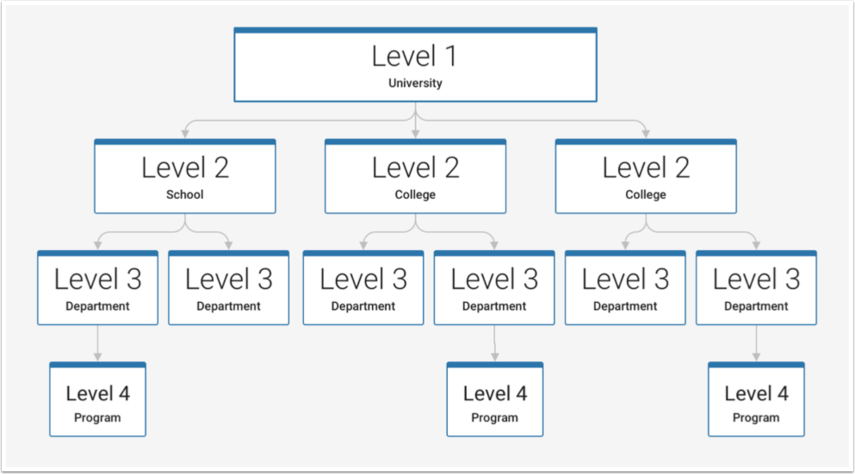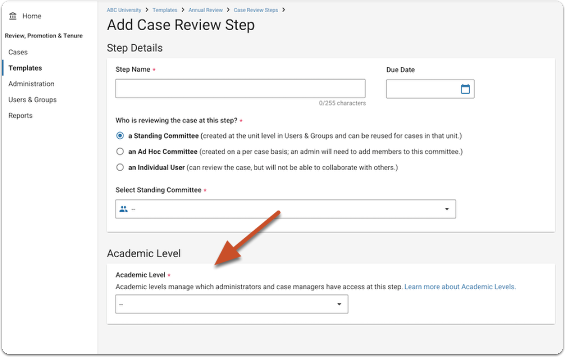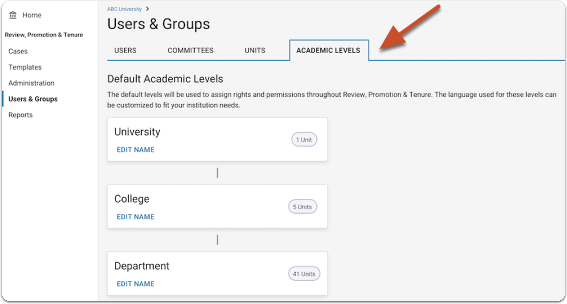Coming Soon in RPT: Manage Bulk Permissions with Academic Levels

Academic Workflow Levels
Once this feature is activated at your institution:
- Each unit that makes up an institution will now inherit an academic level according to the institution’s hierarchy. These levels have default names of Level 1, Level 2, etc., but an Institutional Administrator can customize the levels based on your institution's language.
- Each case review step of a template or case must be assigned one or more academic levels.
- Administrative access to the case at that step will be dependent upon which level(s) of the institutional hierarchy have been set for that step.
- There will be no change in access for regular faculty committee members who do not have administrative roles. The levels feature is aimed at governing administrative permissions.
| BEFORE | AFTER |
|---|---|
| Administrative access to cases is governed primarily by user role, with recusal available on an individual basis. | Administrative access to cases is governed by level of the hierarchy as well as by user role, with recusal of Administrators available on an individual basis. |
| To give someone administrative privileges over one or more cases, they need only be an Administrator in the unit where those cases are. | To give someone administrative privileges over one or more cases, they need to be an Administrator or Case Manager with access at the academic workflow level of the current case review step. |
| To restrict an Administrator’s access to a case at a certain step, you must individually recuse them at that step. | To restrict an Administrator’s or Case Manager’s access to a case at a certain step, simply set that case review step to the desired academic level. |
| “Add Case Review Step” was a modal (pop-up window). | “Add Case Review Step” is its own page. |
| “Manage Recusals” was in a modal (pop up window). | “Manage Recusals” now appears on a page in the platform. |
Why are we making this change?
We have heard from many larger institutions using Review, Promotion & Tenure that the existing tools for manually controlling case access for Administrators, while easy enough on a smaller scale, are difficult to use for larger numbers of cases and administrative users.
We wanted to save you from what, today, can be a lot of clicking required in order to ensure that only the right people have administrative permissions over each case, at each workflow step.
We determined that we needed a way to more elegantly control administrative case access based on logic related both to who the user is, and to which unit (e.g. which department/school) the case is in.
The resulting solution has two parts:
- Two new, more precise user roles already announced: the Case Manager and the Template Administrator.
- A new academic workflow levels feature, which gives you a much more centralized tool to achieve the right access regardless of how large your institution is.
As a whole, these more precise permissions will enable you to run your institution’s faculty evaluation processes both more efficiently and more securely.
What is changing?
Once the academic workflow levels feature is activated for your institution, managing administrative access to cases in Interfolio Review, Promotion & Tenure will become tied to the unit hierarchy and the workflow step.
Upon activation of this feature at your institution, there will be no change in administrative access permissions from how they are today. Every case review step, in every case and template, will automatically have all levels applied—which reflects how it is today.
Prior to release of this feature, administrative case access (e.g. "18 people can administer the case at this step") has been governed primarily by user role, with recusal on an individual basis.
Once the academic workflow levels feature is activated at your institution, you should no longer need to individually monitor recusals for Administrators in order to prevent them from accessing cases.
Instead, access to administer a case will be controlled by which level(s) of the academic hierarchy have been set for the current case step, and which level each administrative user’s role is tied to.

More details
- Each unit will be assigned an academic level, corresponding to the number of levels in the existing unit hierarchy. Again, your institution can label the levels as you wish.
- For example:
- You might use a level named “University” or “Institution” to label the very top level unit, e.g. Blake University
- You might use a level named “College” or “School” to label every unit that is a college/school, e.g. the School of Engineering
- You might use a level named “Department” to label every unit that is a department, e.g. the Department of Biology
- For example:
- Within each template or case, each individual workflow step will be assigned one or more academic levels.
- Administrative access to cases will become dependent upon which “levels” of the institutional hierarchy are set for the current case step.
- That way, for any given workflow step, the only people who can see it are people who have the appropriate role at the level of the hierarchy set for that step.
- So for example, if you have a step called “Dean Review,” you might set the level for that step to be “School/College.”
- Only users who have the Administrator, Committee Manager, or (new) Case Manager role at the “School/College” level will be able to access the case while it is at that step. No more tedious recusing! (Or worse—forgetting to recuse everybody.)
- When it moves to the next step, it is governed by that step’s level.
- Authorized Administrators may edit the possible levels for the institution from the Users & Groups page, via a new tab called “Academic Levels.”

What does our institution have to do?
If you'd like to activate the levels feature and the two new roles this winter (before they get activated for all institutions later in the year), please let your Interfolio Account Manager know.
Upon activation for your institution, no access permissions will change from how they are today. Every case review step, in every case and template, will automatically have all levels applied, which reflects how it is today. However, at that point, Administrators and Case Managers (new role!) will see several new tools and labels related to the levels.
Prepare to audit your templates and user roles prior to your next review cycle. The next thing we recommend is to look ahead to your next review cycle, and make a plan to implement the levels and the two new roles across your templates then. For many institutions, this means the spring.
We know that many of you are in the midst of your formal faculty evaluation cycles right now, so we wanted to make it non-disruptive, and would not expect you to change your templates at the moment.
So, for many institutions, this may simply become part of your next springtime audit/update (e.g. March-May) of RPT templates.
Hence, spring 2022 may be the right time for many institutions to:
- Name and audit your levels
- Update all your case review steps, in all your templates, to reflect the correct levels (yes, we’re investigating how you can do this via API)
- Audit and update all your user roles to take advantage of the new, more precise Case Manager and Template Administrator roles
- And, if you haven't already, we'll help you get set up with the new unique user ID requirement we made available earlier this year—which will protect against user login struggles, and strengthen the security of Interfolio at your institution
When should we expect this change to happen?
Currently, we expect to make academic workflow levels available for activation in January 2021. Once the levels feature has become available, it will become bundled with the two new roles—they come as a package.
We will be releasing more information and materials, including a demo video, as we get closer.
Many thanks, again, to all of you who have helped us better understand these needs and arrive at a solution that will work for all kinds of institutions.
